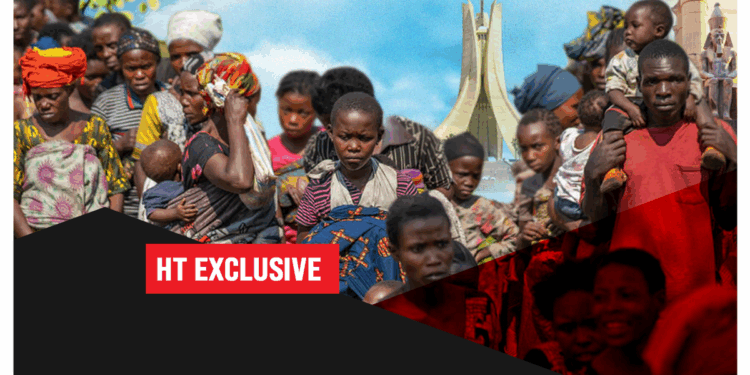By Ebi Kesiena
In July 2009, when Boko Haram insurgents attacked Borno State in northeast Nigeria, 38-year-old Fatima Musa fled her hometown of Gwoza with only her three children. Her husband had died two years earlier, and since then, she had taken on the role of both mother and father. Fatima now lives in a crowded displacement camp in Maiduguri, where daily survival depends on aid rations that are often insufficient. Like many other women, she has turned to petty trading, selling groundnuts and firewood to provide food for her children.
Across Nigeria’s conflict zones, women are disproportionately affected by insecurity. The United Nations estimates that over 2 million people remain displaced in the northeast alone, most of them women and children. Beyond displacement, women face gender-based violence, loss of livelihoods, and the psychological trauma of raising families under constant fear. Yet, despite the weight of these challenges, Nigerian women have been at the forefront of resilience, leading local peacebuilding initiatives, organizing food-sharing networks in displacement camps, and advocating for the safe return of abducted persons.
Sudan and the Struggle for Survival
Thousands of kilometers away, in Sudan, the ongoing conflict between the army and the Rapid Support Forces (RSF) has plunged millions into a humanitarian crisis. Women here not only bear the brunt of displacement but are also navigating food insecurity and the collapse of basic social services.
In Khartoum and Darfur, women-led community kitchens have sprung up as lifelines for displaced families, providing meals despite inflation that has made bread and oil nearly unaffordable. Stories like that of 26-year-old Amal, who fled Darfur with her infant child, highlight both the despair and determination of women caught in the middle of extreme violent attacks.
Women’s voices are also becoming central in Sudan’s fragile peace discourse. Many have called for their inclusion in mediation talks, emphasizing that without women at the decision-making table, peace agreements often fail to address community needs. Their advocacy mirrors the struggles of women in Nigeria’s northeast, Somalia, and the Democratic Republic of Congo (DRC), where conflict has been prolonged by cycles of exclusion.
Conflict, Inflation, and the Invisible Weight on Women
Beyond physical displacement and insecurity, conflict-driven inflation and economic downturns disproportionately impact women, especially single mothers and women working in informal economies. In northern Nigeria, food prices have doubled in the past year due to disruptions in farming and transportation caused by banditry and insurgency. The rise in cooking gas and fuel prices has also forced many women to rely on firewood, exposing them to health risks and environmental hazards.
Similarly, in South Sudan and Sudan, women face impossible choices: whether to buy food or medicine, whether to keep children in school or send them to work. Only recently, the Taliban held a celebration that women were barred from attending, and rights groups, foreign governments, and the UN have continued to condemn the Taliban for their treatment of women and girls, who remain barred from many jobs, education beyond sixth grade, and most public spaces.
In Somalia, where recurring droughts compound conflict, women walk miles daily to fetch water while also navigating hunger. These struggles are rarely counted in the metrics of war, yet they form the silent backbone of Africa’s humanitarian crises.
Despite the hardship, women continue to lead survival strategies. In Niger, for example, women farmers’ cooperatives are experimenting with dry-season farming techniques to feed their families. In the DRC, women are establishing savings circles in displacement camps, pooling meagre resources to provide loans for small businesses. These stories underscore resilience but also highlight systemic neglect: women are carrying nations on their backs while being excluded from formal power structures.
Call to African Leaders to Protect Women, Secure Peace
Our correspondent spoke with Julliet (not real name), a journalist working in Benue State of Nigeria. According to her, women in camps housing displaced communities have become cheap commodities to horny and randy men, further exposing the vulnerability of these women.
African leaders often acknowledge the devastating impact of insecurity on their people, but concrete protection for women remains insufficient. Nigerian President Bola Ahmed Tinubu recently emphasized the need for “regional cooperation to end terrorism and banditry” across West Africa. Similarly, the African Union (AU) has repeatedly declared its commitment to silencing the guns by 2030. Yet, women’s lived realities suggest that political rhetoric has not translated into practical protections.
In Sudan, peace talks often take place without women at the table. In Nigeria, the plight of women in displacement camps is still largely left to humanitarian organizations rather than being treated as a national security priority. In the Sahel, rising extremist violence continues to displace women with little protection offered by fragile governments.
Decisively, insecurity, insurgency, and conflict are not just military or political challenges; they are social crises that disproportionately harm women. If African leaders are serious about building lasting peace, then they must prioritize women’s protection and empowerment. This means ensuring that displaced women and girls have access to education, healthcare, and economic opportunities. It also requires the formal inclusion of women in peace negotiations and governance at every level.
As Grace Ike, Chairperson of the Nigeria Union of Journalists (FCT Chapter), noted in a recent dialogue on insecurity, “When women are silenced or sidelined, communities remain vulnerable. But when women are empowered, they rebuild nations from the ashes of war.”
After all is said, African women are demanding less rhetoric and more action. The resilience of African women shines as a testament to courage and survival. Yet, resilience should not be romanticized as an endless burden. It is time for African leaders to match women’s determination with concrete action. Protecting women in conflict zones is not charity; it is the foundation for Africa’s stability and sustained peace in the region.




































